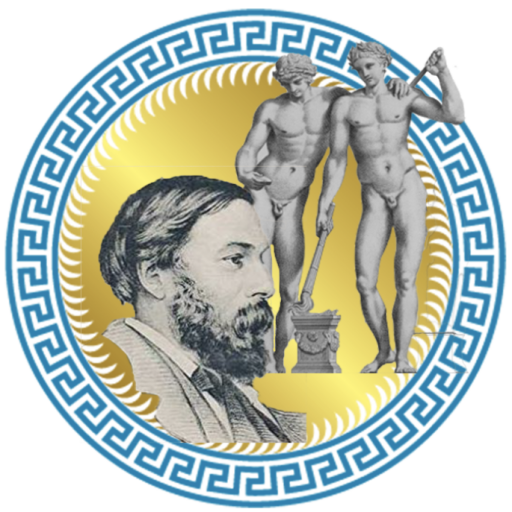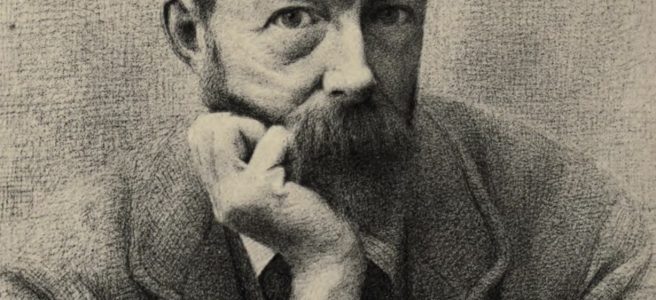This semester in the lab, we have been working on putting a collection of books owned/read by John Addington Symonds together in HathiTrust. At the time of writing this, our current collection is 427 books. Something so amazing about having these books together in one place is that you can search for a word or phrase in all of the books at the same time. While playing around with this feature, I decided to plug in the word religion and was rather surprised to find out that out of the 427 books, 341 of them mention religion.
From there I wanted to know more so I dived into both The Memoirs of John Addington Symonds, edited by Amber K. Regis, as well as John Addington Symonds: A Biography Compiled from His Papers and Correspondence, edited by Horatio F. Brown. As well as learning more about the Crisis of Faith that occurred in the 19th century, I stumbled across an episode that had Symonds contemplating suicide. In fact, he called this the worst night of his whole life, his last night in Cannes in 1868.
I hope to answer one question: how did this night transform his views on religion?
The last night I spent in Cannes was the worst of my whole life. I lay awake motionless, my soul stagnant, feeling what is meant by spiritual blackness and darkness. If it should last forever! As I lay, a tightening approached my heart. It came nearer, the grasp grew firmer, I was cold and lifeless in the clutch of a great agony. If this were death? Catherine, who kept hold of me, seemed far away. I was alone, so utterly desolate that I drank the very cup of the terror of the grave. The Valley of the Shadow was opened, and the shadow lies still upon my soul.
– Memiors, 342
What drew me in is that this seems to be a turning point in Symonds’ life, especially when it comes to religion.
Symonds later wrote when reflecting on this night,
I emerged at last into Stoical acceptance of my place in the world, combined with Epicurean indulgence of my ruling passion for the male. Together, these two motives restored me to comparative health, gave me religion, and enabled me, in spite of broken nerves and diseased lungs, to do what I have done in literature. I am certain of this fact; and I regard the utter blackness of despair at Cannes as the midnight in which there lay a budding spiritual morrow.
– Memiors, 341
Here is Brown’s edited version,
I emerged at last into stoical acceptance of my place in the world, combined with epicurean indulgence. Together, these two motivates restored me to comparative health, gave me religion, and enabled me, in spite of broken nerves and diseased lungs, to do what I have done in literature. I am certain of this face, and I regard the utter blackness of despair at Cannes as the midnight in which there lay a budding spiritual morrow.
–John Addington Symonds: a Biography, 245
One thing about the above quote that is important to note is that Brown’s version removes the line “of my ruling passion for the male,” which in a way exaggerates Symonds’ crisis as being only religious, when in fact it is one due to the coexistence of his sexual and religious dilemmas. But though Brown imposes this interpretation, religion seems to have been important to Symonds regardless. For example, he had his mother’s prayer book by him on his deathbed in 1893, though of course, this could have been for sentimental reasons or religious ones.
This horrible experience was compensated with a newfound belief. A “budding spiritual morrow” is the result of his acceptance of this sexual desire, which contributed to a more positive religious state. It was a night that led him to a freer form of religion, unlike the evangelical Protestantism in which his family raised him (a religion he said suffocated his soul). He wrote,
[Later on, I found the affirmation of religion and contentment in love—not the human kindly friendly love which I had given liberally to my beloved wife and children, my father and my sister and my companions, but in the passionate sexual love of comrades.] Through the whole of my malady and my discourses on it, I had omitted the word Love. That was because I judged my own sort of love to be sin. But when, in the stage of indifference, I became careless about sinning, then, and not until then, I discovered love, the keystone of all the rest of my less tortured life.
– Memiors, 344 (the bracketed portion was marked for deletion in the manuscript, Brown did not reproduce it)
Another important factor that I believe influenced Symonds’ spiritual identity is the 19th-century Crisis of Faith. There was a rise of Biblical criticism, expansion of scientific knowledge (for example, the rise in popularity of Darwin, about whom Symonds’ wrote), and increased exposure of Europeans to other religions. Symonds was also in a very delicate time in his life at this point: he was in his twenties and finding his way. In a letter to his friend W. R. W. Stephens in 1867, he gives some reasons he is not a believer. Two of these are that he can’t acknowledge any principles from which God’s presence can be proved and he is incapable of ascending to ideals as he believes in facts and evidence. As he studied different religions like Buddhism, Islam, and Judaism, he came to believe that the deities of all races are the ideal of the people that worship them. Pretty clearly, as a human of the 19th century, these ideals influenced Symonds tremendously, and his night at Cannes pushed him over the edge.
Once he became indifferent to his old beliefs, he was able to be himself freely (as freely as he could) and live a better version of his life. Here is how Symonds’ biographer, Phyllis Grosskurth, summarizes what he learned from this night at Cannes,
The experience at Cannes has tellingly revealed to him that peace would elude him as long as he resisted his own nature.
–John Addington Symonds: a Biography, 127
Citations:
Symonds, John Addington, and Amber K Regis. The Memoirs of John Addington Symonds : a Critical Edition.London: Palgrave Macmillan, 2016.
Symonds, John Addington, and Horatio F Brown. John Addington Symonds: a Biography. London: J. C. Nimmo, 1895.
Bradstock, Andrew. Masculinity and Spirituality In Victorian Culture. Houndmills, Basingstoke, UK: Macmillan Press , 2000.
Meyer, D. H. “American Intellectuals and the Victorian Crisis of Faith.” American Quarterly, vol. 27, no. 5, 1975, pp. 585–603.
Grosskurth, Phyllis. John Addington Symonds: a Biography. [London]: Longmans, 1964.

